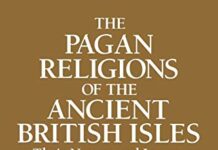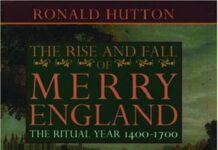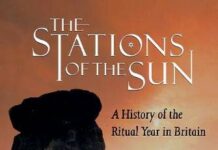
Ebook Info
- Published: 2014
- Number of pages: 707 pages
- Format: PDF
- File Size: 9.33 MB
- Authors: Ronald Hutton
Description
Britain’s pagan past, with its mysterious monuments, atmospheric sites, enigmatic artifacts, bloodthirsty legends, and cryptic inscriptions, is both enthralling and perplexing to a resident of the twenty-first century. In this ambitious and thoroughly up-to-date book, Ronald Hutton reveals the long development, rapid suppression, and enduring cultural significance of paganism, from the Paleolithic Era to the coming of Christianity. He draws on an array of recently discovered evidence and shows how new findings have radically transformed understandings of belief and ritual in Britain before the arrival of organized religion. Setting forth a chronological narrative, Hutton along the way makes side visits to explore specific locations of ancient pagan activity. He includes the well-known sacred sites—Stonehenge, Avebury, Seahenge, Maiden Castle, Anglesey—as well as more obscure locations across the mainland and coastal islands. In tireless pursuit of the elusive “why†? of pagan behavior, Hutton astonishes with the breadth of his understanding of Britain’s deep past and inspires with the originality of his insights.
User’s Reviews
Reviews from Amazon users which were colected at the time this book was published on the website:
⭐Ronald Hutton’s Pagan Britain is a fascinating and comprehensive survey of the archaeological and historical evidence for British paganism. His erudition is amazing. Hutton considers literally hundreds of articles, books, objects and sites in his quest to provide a complete review of what is known about British pagan beliefs. He also traces how British paganism has been interpreted from Victorian times to the present day. The historiography often fascinated me as much as the discussions of henges and burial mounds. He analyzes how scientists and humanists approach the same material in markedly different fashions. Thus, the book is ultimately a meditation on how (in his words) “truth can be established in scholarship…especially in the study of the remote past.”I can best give you an idea of his comprehensive approach by discussing his chapters on Mesolithic and Neolithic Britain. He discusses famous sites, such as Stonehenge, and the history of both the research at the site and theories about the site. He discusses typical artifacts from the period, and how they have been used to contemporary scholars to try to understand the past. Scholars have used many approaches to understand this material and Hutton never uses dismissive language to discuss any of them. He has a fascinating discussion on how contemporary academicians and “alternative” archaeologists have approached the same material. He traces the intellectual history of both and shows how what was yesterday’s “alternative” explanation sometimes becomes today’s orthodoxy. Again and again, Hutton emphasizes how little we actually know about the preliterate past and how many explanations can be attached to the same artifacts. Archaeology of religion, he writes, can “recover the material remains of ritual action…but not (usually) the ideas which inspired them.”Little seems to escape his purview as he discusses paganism through the Iron Age, Roman Britain and the conversion of Britain to Christianity. He also has a comprehensive discussion of possible survivals of paganism in Christian period. Contemporary Pagans may be disappointed that he finds relatively little evidence for paganism surviving into the medieval age. In these chapters again he emphasizes what is actually concretely known and how this evidence is used. Thus, in discussing the possibility of human sacrifices, he devotes much time to detailing graves, burial practices and human skeletal remains found in unusual locations. Decapitated skeletons have been found and Hutton discusses alternative explanations for this. Roman sources claiming the British practiced human sacrifice are carefully deconstructed. Hutton also discusses various contemporary theories about human sacrifice. Hutton’s conclusion here–as it is again and again in this book–is that the evidence supports a variety of possible explanation for archaeological remains and that human sacrifice in prehistoric Britain remains and will probably remain unprovable.He also discusses the intellectual history of modern interpretations of the British pagan past. Thus, he has an illuminating discussion on the “Goddess” theory which so riveted many scholars earlier in the 20th century. He shows how the needs and thought patterns of the present have often skewed the interpretations of the past.Hutton is a very fine writer. His prose is always clear and often beautiful. I imagined once or twice that a reincarnation of Shakespeare might shamelessly lift from Hutton’s prose the way the actual bard did from Holinshed, though I suppose today creative plagiarism of that nature is out of style. The major difficulties reading the book result from the sheer amount of information presented. This is a dense and fascinating book. The book is illustrated with drawings and black and white photographs. Embedded in the text, they illuminate the argument of the book but do not particularly add to its beauty.I think anyone interested in history, archaeology, pagan religions or Britain would find this book well worth the time. Hutton is not sensational the way some books and TV shows about this material have been but his solid scholarship is much more illuminating.I do not know how a contemporary Pagan would react to this book; but it seems to me Hutton, a genial and intelligent man, is totally and completely respectful of contemporary Pagan spirituality and that a contemporary Pagan might very well want this book in his library.
⭐This is a fantastic book that I thoroughly recommend. It is detailed and fact filled, yet well-written enough to be easily comprehensible to the beginner in the subject. I recommend it for anyone who wants to learn more about British pre-history and British pagan religion. Notably, it takes care not go further than the data. It states what is known, it provides what interpretations have been presented by other scholars, and encourages the reader to make their own mind up. This is important as so much is unknown about British prehistory, it is very much impossible to prove many theories one way or the other. Therefore it is a highly educational and empowering book that helps the reader imagine the distant past in a valid and personal way.One note of warning, if you’re looking for blood thirsty descriptions of pagan sacrifice, the author tends to minimize the possibility of this type of thing, even when I would say they are justified. I think out of respect for the modern pagan movement.
⭐Once again Hutton provides a meticulously written work that is long on scholarly research and short on the fuzziness and conjecture that is seen in a lot of work on this subject. ‘Pagan Britain ‘ covers the length and breadth of the island with frequent references to Ireland as well. Although Hutton’s work is (at times) heavy going, this is really to be expected when the material is covered in such exhaustive depth, the information contained in this book can be used again and again for academic research ( which is my purpose) or for simply allowing oneself to take a snapshot look back into a much maligned period in history. Hutton doesn’t advocate any specific position in this book, but he does allow room for new scholarly works that could be viewed as controversial. A very interesting book and an important book for any seerious book collector.
⭐Hutton knows his material well. This is a fascinating and thoroughly researched book. It’s hard to put down. His transitions from paganism through to Christianity are well done and gives a bird’s eye view of the time in which he writes. Highly recommended.
⭐This is a re-working and updating of Hutton’s previous publication, “The Pagan Religions of the Ancient British Isles”. Had I known, I’d probably have saved my money. (“Pagan Religions…” might be OOP). It’s VERY good and VERY thorough, and if you haven’t read “Pagan Religions…” then I’d go ahead with this one. All of that being said, I’m a big fan of Dr. Hutton.
⭐This is as thorough a precis of available historical, archeological and literary sources as exists. Both the academic and the interested layperson will benefit from this terrific effort. Ronald Hutton is superb.
⭐This book is significant only to trained individuals with a significant training in anthropology/archeology. It is tough slogging for those who are merely fans of history or religion. My impression is that the field of early religious practice is evolving in meaningful ways, but this text is hard slogging.
⭐The value of this book is its overview of the current state of scholarship together wiith the evidence for and against different interpretations. I have read numerous books on this area and this book accords well with the latest findings.
⭐With Pagan Britain, you get exactly what the title says. Hutton covers the entire range of pagan belief and tradition in Britain, and nowhere else. Interested in France? Tough. But for everything from paleolithic, through Roman, to early modern folk beliefs? Covered. As far as its specific subject matter is concerned, this book is near perfection. Not only that, but nowhere else in this reader’s experience has there ever been such a well considered exploration of any subject.By nature, with much of Britain’s past being accessible only through archaeology and histories several layers removed from the fact, must of what constitutes Britain’s pagan past is not knowable. Pagan Britain not only embraces this, it makes it a central part of the narrative. Different interpretations of the evidence are well presented, but the interpretations themselves are scrutinised as reflections of the prevailing attitudes of the times, Hutton offers as much insight into academia, popular culture, and the nature of enquiry as he does into the named subject matter.Not only does Hutton present an academic tour de force, but he manages it in an assessible and engaging book that actually manages to be a real page turner. Pagan Britain is truly without parallel.
⭐This impressive and thoroughly well researched book looks at paganism in Britain, the scope covers pre-history (no written records) up to modern day. The work is very detailed and at times its somewhat bogged down by too much detail. Further, while i admire Hutton’s reluctance to state facts or assumptions it is also quite frustrating that most chapters end with a admission that we simply don’t know the answers. Nevertheless, it is interesting to read about early human activity in Britain, the crude cave drawings and burials, then to further explore the pagan theme with the introduction of outsider influences such as the Romans and Anglo-Saxons. This work is heavily archaeologically based (after all, there are no written records in pre-history) and i do tend to prefer the written sources but we must work with the evidence we have.Most interesting were Hutton’s arguments concerning the religion of a Mother Goddess and his argument against paganism surviving the onset of Christianity. Also, i had previously thought the Anglo-Saxons weren’t of much interest to me but the fact they arrived to Britain as pagan and were converted pretty quickly to the new faith is very interesting and i plan to read more on Anglo-Saxon Britain as a result. I would recommend this book but would warn that for the most part the author sets out ideas and argues for and against them rather than gives any definitive answers on the subject.
⭐I had listened to an online lecture hosted by the Weald & Downland Open Air Museum on the same subject by Prof. Hutton a few days ago, and was impressed by the depth of his knowledge and the clear way in which he expressed quite complex ideas. I bought the book on the strength of this experience and an initial scan of the content promised much of the same. If you are interested in the pagan history of the British Isles you should buy it. I was less than impressed with the way the parcel was dumped on our doorstep while we were out – a matter of a few feet from the front door to the busy footpath. The email confirming delivery said it had been “handed to resident”. It wes not – this sort of behaviour does not reflect the values of the Amazon brand.
⭐Deeply informative and a joy to read – at first I was put off because there is a lot of writing in every page. But there are no fluff and fillers and certainly no new age woo woo. This book gave me a profound insight into paganism through the ages, perfectly scholarly and critical. Ronald Hutton never fails to give room to the different view point other historians have on the issues.
⭐It explained a lot about Britain before we became christian, a lot of historical places are mentioned before the Romans came but there is quite a bit on the modern days so something for the old and new ways.
Keywords
Free Download Pagan Britain 1st Edition in PDF format
Pagan Britain 1st Edition PDF Free Download
Download Pagan Britain 1st Edition 2014 PDF Free
Pagan Britain 1st Edition 2014 PDF Free Download
Download Pagan Britain 1st Edition PDF
Free Download Ebook Pagan Britain 1st Edition





